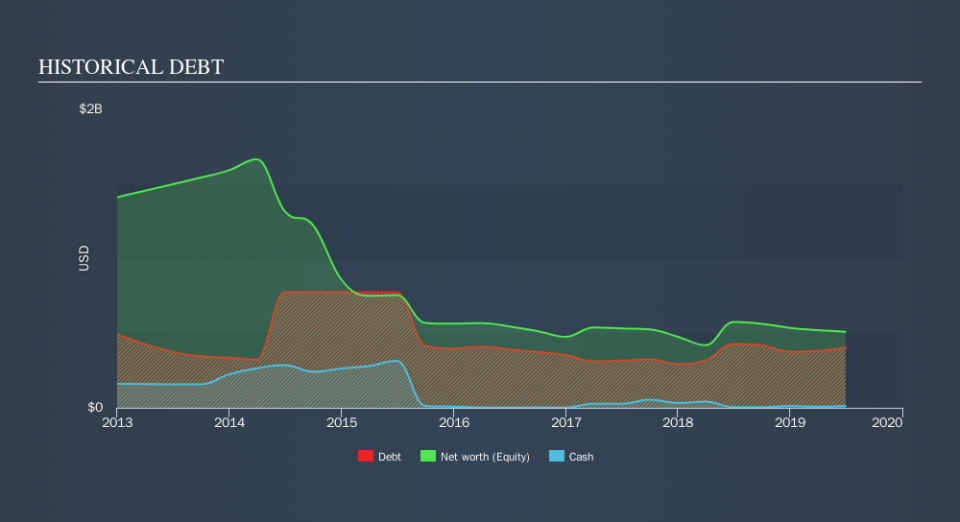Does Civeo (NYSE:CVEO) Have A Healthy Balance Sheet?

Some say volatility, rather than debt, is the best way to think about risk as an investor, but Warren Buffett famously said that 'Volatility is far from synonymous with risk. So it seems the smart money knows that debt - which is usually involved in bankruptcies - is a very important factor, when you assess how risky a company is. Importantly, Civeo Corporation (NYSE:CVEO) does carry debt. But is this debt a concern to shareholders?
Why Does Debt Bring Risk?
Debt is a tool to help businesses grow, but if a business is incapable of paying off its lenders, then it exists at their mercy. Ultimately, if the company can't fulfill its legal obligations to repay debt, shareholders could walk away with nothing. While that is not too common, we often do see indebted companies permanently diluting shareholders because lenders force them to raise capital at a distressed price. Of course, the upside of debt is that it often represents cheap capital, especially when it replaces dilution in a company with the ability to reinvest at high rates of return. The first thing to do when considering how much debt a business uses is to look at its cash and debt together.
Check out our latest analysis for Civeo
What Is Civeo's Net Debt?
The image below, which you can click on for greater detail, shows that Civeo had debt of US$403.1m at the end of June 2019, a reduction from US$427.2m over a year. On the flip side, it has US$13.5m in cash leading to net debt of about US$389.6m.
How Healthy Is Civeo's Balance Sheet?
We can see from the most recent balance sheet that Civeo had liabilities of US$92.5m falling due within a year, and liabilities of US$417.9m due beyond that. Offsetting this, it had US$13.5m in cash and US$90.8m in receivables that were due within 12 months. So its liabilities outweigh the sum of its cash and (near-term) receivables by US$406.1m.
The deficiency here weighs heavily on the US$218.7m company itself, as if a child were struggling under the weight of an enormous back-pack full of books, his sports gear, and a trumpet." So we'd watch its balance sheet closely, without a doubt After all, Civeo would likely require a major re-capitalisation if it had to pay its creditors today. The balance sheet is clearly the area to focus on when you are analysing debt. But ultimately the future profitability of the business will decide if Civeo can strengthen its balance sheet over time. So if you want to see what the professionals think, you might find this free report on analyst profit forecasts to be interesting.
In the last year Civeo wasn't profitable at an EBIT level, but managed to grow its revenue by8.2%, to US$466m. We usually like to see faster growth from unprofitable companies, but each to their own.
Caveat Emptor
Over the last twelve months Civeo produced an earnings before interest and tax (EBIT) loss. Indeed, it lost a very considerable US$43m at the EBIT level. Considering that alongside the liabilities mentioned above make us nervous about the company. It would need to improve its operations quickly for us to be interested in it. It's fair to say the loss of US$61m didn't encourage us either; we'd like to see a profit. In the meantime, we consider the stock to be risky. For riskier companies like Civeo I always like to keep an eye on whether insiders are buying or selling. So click here if you want to find out for yourself.
Of course, if you're the type of investor who prefers buying stocks without the burden of debt, then don't hesitate to discover our exclusive list of net cash growth stocks, today.
We aim to bring you long-term focused research analysis driven by fundamental data. Note that our analysis may not factor in the latest price-sensitive company announcements or qualitative material.
If you spot an error that warrants correction, please contact the editor at editorial-team@simplywallst.com. This article by Simply Wall St is general in nature. It does not constitute a recommendation to buy or sell any stock, and does not take account of your objectives, or your financial situation. Simply Wall St has no position in the stocks mentioned. Thank you for reading.

 Yahoo Finance
Yahoo Finance 
